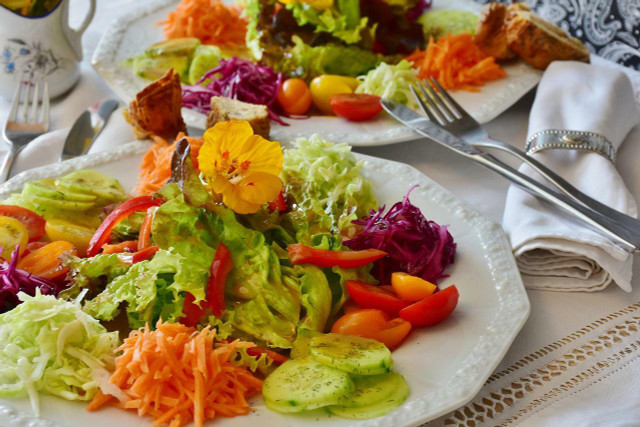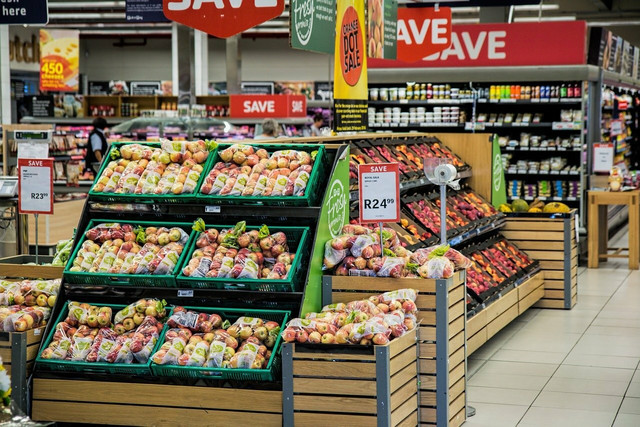Whether you're interested or not in becoming vegan, definition is vital for understanding the movement. Here you'll find all of the basics, including a few surprises.
Let’s start with the meaning of vegan as a term. Most people think that vegans only eat vegetables and grains. The current vegan definition is that it’s a philosophy and way of living which seeks to exclude all forms of cruelty to animals for any reason, including food, clothes or lifestyle.
So, pretty simple: being vegan means living a lifestyle where you cause as little suffering to animals as possible. The most obvious way that our lives interact with those of animals is in the food we eat. But, as we’ll explain, being vegan involves more than just abstaining from meat and cheese.
A Brief History of Veganism

(Foto: CC0 / Pixabay / nonbirinonko)
How far back does veganism go?
The definition of the term “vegan” came from Leslie J Cross in 1949, five years after the inception of The Vegan Society, the world’s first vegan organization, based in the UK. Its initial definition was “[t]he principle of the emancipation of animals from exploitation by man”, which was later clarified to refer to vegans as those who “seek an end to the use of animals by man for food, commodities, work, hunting, vivisection, and by all other uses involving exploitation of animal life by man.”
Of course, it’s impossible to pinpoint the genesis of veganism to an exact date. However, veganism as a principle dates back thousands of years. It is commonly believed that Greek sage Pythagoras was either vegetarian or vegan, living off such things as honey, bread and vegetables. He taught that all animals should be treated as kindred and abstained from meat, animal products, and advised his followers against any act that would cause harm to animals.
One of the earliest known true vegans, however, was the Arab poet al-Maʿarri, born in 973. He famously instructed his followers “[to] not desire as food the flesh of slaughtered animals / Or the white milk of mothers who intended its pure draught / for their young”.
Today, thanks in no small part to increased animal welfare and environmental concerns, veganism is growing quickly around the world. In the US, while only 3 percent called themselves vegan in 2018, nearly a quarter of Americans reduced their meat consumption in 2019.
Dietary vs. Ethical: Are All Vegans the Same?



(Foto: CC0 / Pixabay / yogendras31)
Although vegans are often portrayed as one homogenous group, there are actually four different kinds of vegans:
- Ethical vegans: Make lifestyle choices (for example food, clothes, entertainment and household products) primarily for the benefit of animals, the environment, or social justice.
- Environmental vegans: Motivated by the desire to follow a sustainable diet that avoids the negative environmental impact of meat and dairy production.
- Health vegans: Follow a vegan diet for health reasons, including losing weight.
- Religious vegans: Have a vegan lifestyle due to religious beliefs. Hinduism, Jainism and Buddhism are all strong proponents of a plant-based diet and believe in the concept of Ahimsa, meaning kindness and non-violence towards all living things.
These four groups can be loosely divided into two main subsects of veganism: dietary and ethical. The basic difference between these groups is that either you follow a vegan diet, or you follow a fully-fledged vegan lifestyle. For example, following a vegan diet to lose weight would make you a dietary vegan. However, abstaining from animal products (food, clothes and other kinds) because of their environmental impact would make you an ethical vegan.
What Do Vegans Eat?



(Foto: CC0 / Pixabay / RitaE)
Put simply, vegans can eat everything that non-vegans can eat, so long as it doesn’t come from an animal. This obviously includes meat, but also dairy products such as butter, milk and cheese. There are also a few borderline foods, that sit on the border of the definition of veganism and ignite some controversy. To give you some examples: honey is made by bees, fig cultivation harms wasps (so figs are often not considered vegan), and McDonald’s french fries contain beef flavor made from dairy derivative (in the US at least). This is why it is very important for vegans to check labels (see: below), to ask behind the counter and to do their research if they want to truly avoid animal products.
Making delicious vegan food is within reach for even the most uninspired cook. We recommend looking for recipes with whole foods (foods close to their natural state, such as fresh vegetables and grains). As a vegan, it’s essential that you also make sure you’re getting enough of what you need in your diet. There are many vegan supplements on the market which are super easy to use. It’s also possible to get enough protein from plant sources, and there are many delicious sources of calcium for vegans.
Nowadays, it’s never been easier to follow a vegan diet. Each year, there are more and more imaginative and delicious vegan substitutes for cheese and meat in all its forms. There’s an ever-increasing number of options in restaurants, supermarkets, and even gas stations and vending machines. Of course, vegan food doesn’t need to be boring and healthy. Vegan fast food is on the rise too, perfect for when you’re feeling the desire for grease creeping in (although ethical vegans may take issue with some of these establishments because of their animal rights records).
If you’re looking to eat out, check out apps or sites like Happy Cow to find vegan restaurants near you across the US and beyond.
Is Vegan Food Actually Healthy?
Contrary to popular belief, vegans can eat a whole lot. Vegan food is diverse and tasty, and with a little planning and some good vegan recipes up your sleeve, you won’t be bored or malnourished.
When it comes to the age-old question of whether a vegan diet is healthy or not, the answer is slightly more complicated than a simple ‘yes’ or ‘no’. Think of it this way — is a non-vegan diet healthy? Not necessarily; it depends on how much unhealthy food the individual eats, as well as how balanced the diet is. The same applies to a vegan diet.
It’s worth noting that many vegans take supplements of Vitamin B12, which is usually found in meat, fish, eggs, and dairy. A lack of Vitamin B12 can cause anemia.
Veganism Is More Than Just Food



(Foto: CC0 / Pixabay / gershoots)
Veganism typically involves more than just a change of diet. The clothes we wear, products we use, vacations we plan — a vegan lifestyle means looking deeper into all aspects of society to limit or even completely avoid the chances of animal suffering.
Fashion
Some obvious examples are avoiding wool (from animal fur), silk (made from the cocoons of silkworms) and leather (dried animal skin). These days, there are many different kinds of vegan leather, which look as good as the real thing, but without the guilt. Certain dyes, glues and other manufacturing products can also be made from animal derivatives, so look carefully at the label before buying.
Travel
Traveling isn’t inherently non-vegan. However, there are some things you may want to reconsider. Obviously, activities such as hunting and even safari treks do harm to wildlife. But aside from that, taking a look at whether your beach resort has destroyed any wildlife habitats, or whether that elephant sanctuary is actually doing more harm than good are good places to start.
Products
From plastic bags containing animal fat, to condoms using milk derivatives, to perfume, cosmetics, crayons and even cigarette testing on animals, it can be hard to find products with a clean record on animal rights. Luckily, labels like Leaping Bunny identify cruelty-free labels in the US so you don’t have to. They also provide a handy app you can check products with on the go.
V-Label, Leaping Bunny and Other Vegan Labels You Should Know



(Foto: CC0 / Pixabay / stevepb)
If you’re new to veganism, it may surprise (and intimidate) you to find out all of the things you thought were vegan but aren’t. To help you decipher what’s safe, it’s important that you read up on what certain labels mean and look out for them when you’re making a purchase. It’s important to note that the term “vegan” is not regulated by the USDA, FDA, TTB, or government entity. This makes it easy for products to self-certify a product as vegan even though there may be some aspects of the supply chain that vegans could take issue with.
Many products have a ‘Suitable For Vegans’ or ‘Certified Vegan’ logo to make it immediately obvious if something is suitable for vegans. These logos guarantee products have not been made using animal products or byproducts and that animal testing was not conducted at any stage. You can also scan the allergen information for dairy, eggs, or seafood ingredients common in foods, which are highlighted in this article.
V-Label USA and Certified Vegan Logo are trustworthy vegan certifiers in the US.
Keep in mind that even if you follow these two instructions, animal products are, as we’ve just mentioned, extremely pervasive. PETA has a handy list of animal-derived products on their website which are worth acquainting yourself with.
This All Seems Like a Lot To Take In…
…and it is. Changing to a vegan lifestyle (or diet) does require some research and some big changes.
However, nobody is forcing you to become vegan overnight. Everyone has to start somewhere. Take it step by step, and take inspiration from the thousands of great blogs and websites written by those who have gone before you. And, think about how much better you will feel once you are living a lifestyle that is more aligned with your beliefs!
Read more:
- 6 High Protein Vegan Breakfast Recipes To Give You Energy For the Day
- Veganuary: How to Go Vegan This January
- Is Alcohol Vegan? A Guide to Vegan Booze
Important Information regarding Health-related Topics.
** Links to retailers marked with ** or underlined orange are partially partner links: If you buy here, you actively support Utopia.org, because we will receive a small part of the sales proceeds. More info.Do you like this post?








